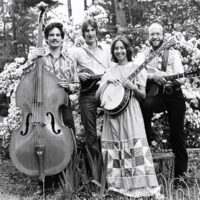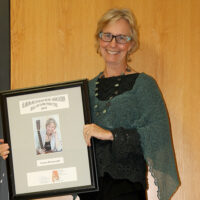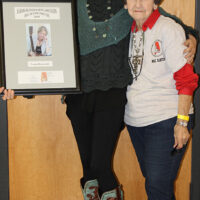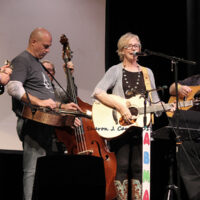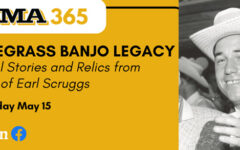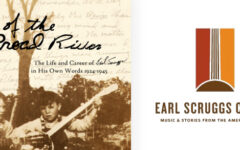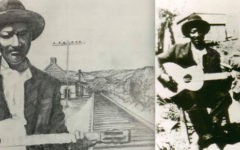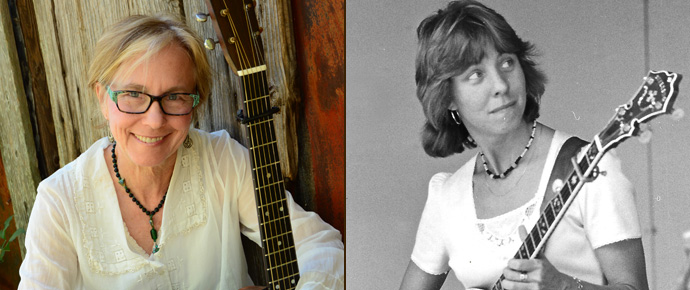
The Alabama Bluegrass Music Hall of Fame honors those from the state of Alabama that have shown great accomplishment and contribution to the bluegrass music industry. For 2019, they have selected Louisa Branscomb to receive this signal honor.
According to Alabama Bluegrass Association president David Boley, “Louisa Branscomb has by far surpassed these requirements in many roles: as a songwriter, singer, musician and paradigm changer for implementing song-writing into schools and communities. We in Alabama are very proud of her tremendous achievements throughout her career and proud that she has stayed true to her Alabama roots.”
Chris Jones wrote for Bluegrass Now ..
“Some of the finest original bluegrass music has been characterized by the blending of the simple and the complex. It could be argued that this is one of the many things that set apart Bill Monroe’s sound from much of the music of his time. The songs of Louisa Branscomb have the kind of depth that results from such a fusion.” He went on to say, “Louisa is a household word in song-writing.”
She was also previously featured in a Songwriter Profile here at Bluegrass Today.
As a child, Branscomb was always curious about people and the natural world around her – a curiosity that led to her spontaneously writing her first song at age of five. “I was a shy kid, but creative, and I think it was a way for me to relate to nature, animals and people around me, and put my experience and feelings into form. I was captivated by the beauty of the natural world and wanted to express it, and it came out in songs. I think this is why so many of my songs today, no matter what they are about, use metaphors from the natural world. For example, the person dying in I’ll Take Love, he wants to get the harvest in before leaving the earth, and he feels the pain and loss of knowing he will never be able to see his familiar sunsets over the mountains with his wife.”
Branscomb’s first composer distinction was earned at age of 11, when a teacher entered a song of hers in a contest. She took first place with her composition, and played her piece with the Birmingham Symphony at the Civic Auditorium before an audience of several thousand people. By college she had 450 carefully typed and numbered songs.
However, structured classical music was not to be her path. Growing up with a blues-playing father, Branscomb learned guitar and piano and preferred to improvise and write her own songs. First known as a precedent-setting performer with her group Boot Hill (she was possibly the first women to found and co-lead a band while also playing banjo and writing most of the band’s material), song-writing had long since emerged as a deep and natural calling.
Her songs comprised the title tracks and about half of her band’s three albums, and the band’s originals were a hallmark of their heavy playing schedule throughout the 1970s. Blue Ridge Memories became a chart hit in Japan, Steel Rails was already in demand by other bands, and the group’s Gospel album also won a bluegrass Gospel award. At the same time, Steel Rails had made it into the hands of Mel Tillis (unreleased), the McPeak Brothers and Alison Krauss (though Louisa didn’t know until bumping into Alison later at the Station Inn), at which time Steel Rails was already #1 in many countries, was her first single tracked by Billboard, had earned a bluegrass video award and headed into its record-setting 18 months on the Bluegrass Unlimited charts.
The album on which Steel Rails is one of the tracks, I’ve Got That Old Feeling, won the Grammy award for Best Bluegrass Album in 1991. This same year, it became SPBGMA Song of the Year. A few years later, John Denver’s recording of the same song was on the 1998 Grammy award winning album All Aboard!
This video traces Branscomb’s story through the Steel Rails ……
Branscomb inspired others, including Alison Brown, in her role as a banjo player, and the author of the song brought a whole generation of youngsters, especially girls, into bluegrass. But Branscomb believes in going farther than writing songs. “I see songs as the most powerful agent there is to touch someone and change and transform their life – and this can happen for the writer or the listener. I also see songs – especially original songs – as a powerful tool to join people together across their differences and build community and connection.”
This vision has inspired her own Woodsong Farm Writers’ retreat, where she has nurtured and taught some 800 songwriters over the last 30 years, creating her own paradigm that helps each writer find their most authentic story. “I think my psychology background helps me understand on a personal basis where songwriters are coming from, and I do a better job helping support that particular individual in a way that they can write their best and truest song.” One student, relates “Most people talk about song-writing. Louisa is the only person I know who really teaches it. She lives it and breathes it. She knows how to bring out the deepest and best in you, and how to make that song the best it can be to affect others.”
To date, Branscomb has had some 200 songs recorded, with cuts by Dale Ann Bradley, Claire Lynch, Janet McGarry, Karen Lynn, Nu-Blu, the McPeak Brothers, Fontanna Sunset, Valerie Smith, and the Daughters of Bluegrass, among others. Dear Sister, co-written and performed by Lynch, took IBMA Song of the Year in 2014.
Here is the story about and music of Dear Sister …
Numerous other songs have charted in the U.S. and foreign countries, including Will I Be Good Enough, Don’t Turn Your Back, I’ll Take Love, while Steel Rails itself has been recorded over 380 times by different bands on YouTube.
Branscomb’s song-writing program combines her PhD in Psychology, where she studied how the human spirit can survive and transform hardship, especially through creativity. She also holds an M.A. in Education, another in Counselling (1979) (both from Wake Forest University); and has had an impressive career teaching at the college level. Branscomb says, “It used to feel I had several separate loves and careers – the psychology, the music, and therapy. Now things have come full circle and have all woven their way into my model for approaching life and for writing music… and helping songwriters with ways to live a rich and creative life that supports their art.”
Branscomb has used her training to the full. Ever the pioneer, she established a non-profit organisation, ScreenDoor Songwriter Alliance, which has gained national recognition for its innovative work assisting traumatized children through song-writing. Her work with song-writing with children was featured at the IBMA’s Academic Symposium. All of these efforts, over many years, led to her receipt of the coveted Distinguished Achievement Award from IBMA in 2017.
She is currently working on two song-writing books and accepting speaking engagements about the power of songs as a tool accessible to all for enriching life, healing and bringing people together.
Also, Branscomb has promised me that there are some new original recordings in the pipeline, “this is album #12 for me.”
“The thing about Louisa is she’s always been her own person,” says Mae Hinton, long time secretary-treasurer of the Alabama Bluegrass Music Assoiation. “I’ve known Louisa and her music for some 45 years.” Hinton goes on to say, “when they [Boot Hill] played at Horsepens 40 in the 1970s, she explained to producer Warren Musgrove that she didn’t want to wear the wrist band because it got in the way of playing. Warren said, “play it or leave.” Louisa put it on her ankle and didn’t miss a beat. I knew we had ourselves an independent young woman in bluegrass. She’s a force!”
As if to prove that song-writing for Branscomb is like oxygen for us mere mortals, she decided to write a song “on the spot” in appreciation of her Alabama roots. Called That’s All I Need, the chorus goes:
I’m longing for those Alabama pines
I belong back in those hills that I call mine
People there they’ve got my back
They keep my heart on track
And cotton fields as far as I can see
That’s all I need
In a Déjà vu moment ….
However, it was not the award that was the highlight of Louisa Branscomb’s evening. It was sitting on her guitar case with Rae Slaughter, the four-year-old daughter of singer-songwriters Shannon and Heather Slaughter. The song that emerged was about what Rae loves to do and the two called it God Gave Me the Gift. So, just as a five-year-old in Birmingham wrote her first song at age of five, in the mid-1950s, another young Alabama songwriter takes flight.
Others who were honored at the 4th Alabama Bluegrass Hall of Fame induction ceremony on Saturday, March 3, 2018, were Glenn Tolbert, Rex Locklar, Jim Connor, The Sullivan Family and The Foster Family.
The inductions took place during the Alabama Bluegrass Music Association Bluegrass Showcase that featured eight bands; Allen Tolbert, Crains Nest, Southern Strangers with Jake Landers, Pine Mountain, Cottonmouth Creek, Valley Road, Over the Mountain and Bluewater Road.

